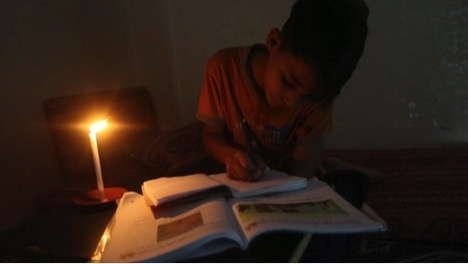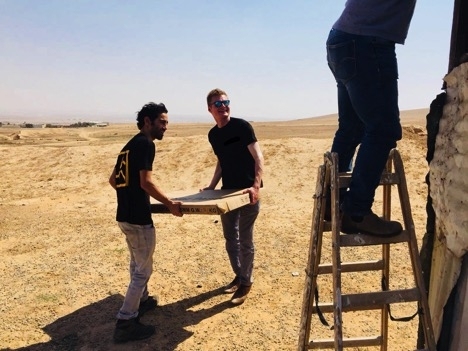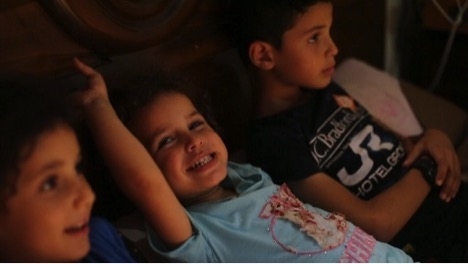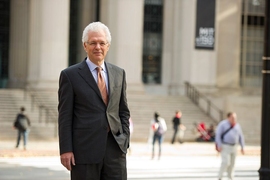Lukas Kamphausen MFin '18 recently graduated with a master of finance degree from MIT’s Sloan School of Management. Last January, he participated in MIT Sloan’s Israel Lab, organized in collaboration with the MIT International Science and Technology Initiatives (MISTI) MIT-Israel program. MISTI provides MIT students with high quality internship, research and teaching experiences in international companies, universities, research institutes, and high schools. While participating in the Israel Lab, Kamphausen took part in a hackathon organized by MISTI’s PeaceTech Initiative and Our Generation Speaks, a fellowship program and incubator, hosted at MassChallenge in Jerusalem. “I loved the Middle East so much and just had to come back in order to make an even larger impact for families living in this region,” Kamphausen says.
Learning about new regions while making a real impact
Currently, Kamphausen is doing an internship through MISTI at SunBox, a startup that sells affordable and self-installable solar energy systems to families living in the Gaza Strip. “This second experience in the region has really enabled me to get a deeper understanding both of how to work with people from very different backgrounds, and how as an MIT student I can make a real impact,” Kamphausen says. “More than 2 million Gazans live with less than four hours of electricity a day. Hence, most families do not have refrigerators, access to the internet or lights at night. People can’t work, students can’t study, and entrepreneurs can’t run a business.”
SunBox was founded in June 2017 by Majd Mashharawi, a 24-year-old recent civil engineering graduate from Gaza City. “She is one of the most inspiring entrepreneurs I have ever met,” Kamphausen says.
Mashharawi explains that entire areas in the Middle East suffer from a lack of sufficient electricity, which severely affects both quality of life and opportunity for economic growth. Reflecting on these regional issues, she says, “There did not seem to be any solution on the horizon, so we decided to bring the solution ourselves. That’s why we introduced SunBox to the market,” Mashharawi adds. “The region has a resource that can be harnessed: an average of 320 days of sunshine a year, making solar energy an ideal source of electricity production. It is simple, affordable and available to everyone.”
SunBox sells affordable smart solar kits that every family can install by themselves. It powers not just lights, but also laptops, phones, internet, and even a fan or a TV. The system is safe to use, even around children. “Gaza’s unemployment rate amounts to 44 percent. This is among the highest in the world. We believe that by providing people with a constant access to electricity, we will be able to improve this situation both significantly and sustainably. Kids will be able to study at night, students will have continuous access to the internet, and new entrepreneurs can build their own businesses.”
Last month, SunBox successfully sold and installed their first solar energy systems in Gaza. This month, the company plans to sell their next 200 devices. “For us, 200 units is not just a simple number in our cash flow statement,” Kamphausen says. “We’re proud that we’re changing the lives of 200 families, almost 1,200 people, in a single month!”
Making “an incredible difference for this region”
“Local families’ purchasing power is very limited; this is why we launched our crowdfunding campaign in order to subsidize each system by about $100 per unit,” Kamphausen says. “We want to make sure that all Gazan families will be able to afford our devices, especially those who are currently most disadvantaged or unlucky.”
Kamphausen, Mashharawi, and their team are already dreaming about expanding to other markets. After solving the energy crisis in Gaza, SunBox plans to support refugee camps around the region, including Syrian refugees in Jordan and off-grid Bedouin communities throughout the Middle East. “We just successfully installed our first pilot systems in the Bedouin community and we’re confident that we’ll soon be able to penetrate other markets, too.”
Middle East Entrepreneurs of Tomorrow
“After learning about the Middle East, its culture on campus and working in companies in the region, I decided I also wanted to see how I could bring the world class education I received at MIT to others.” Through MISTI, Kamphausen will teach entrepreneurship to Israeli and Palestinian students as part of the MEET program in Jerusalem. MEET brings together young Israeli and Palestinian leaders to create positive change through technology and entrepreneurship, in partnership with MIT.
At MEET, Kamphausen is working together with Celina Mukarker, the program's student program coordinator.
“Five years ago, I participated in the MEET program myself as a student. MEET and MIT student instructors provided me with outstanding knowledge in both entrepreneurship and programming, as well as an incredible global and local network,” Mukarker says. “As a Palestinian, I am now able to pursue so many different opportunities and career paths that would have otherwise been almost impossible. In the future, I aim to further challenge the current status quo by continuously trying to improve the Israeli-Palestinian relationship,” she adds.
After his experiences in the Middle East, Kamphausen will start working for a global management consulting firm in Berlin, Germany. “Nevertheless, I will always stay involved in this region,” he says. “I will continuously try to build on my MISTI experiences in the region to be effective in making global impact and improve the lives for the most disadvantaged families on earth, both in the Middle East and elsewhere.”
MISTI has sent over 9,500 students abroad to date, and currently sends over 1,200 students annually to more than 25 countries. It is housed within the Institute's School of Humanities, Arts, and Social Sciences. For more information about MISTI’s programs in the Middle East please contact David Dolev.












